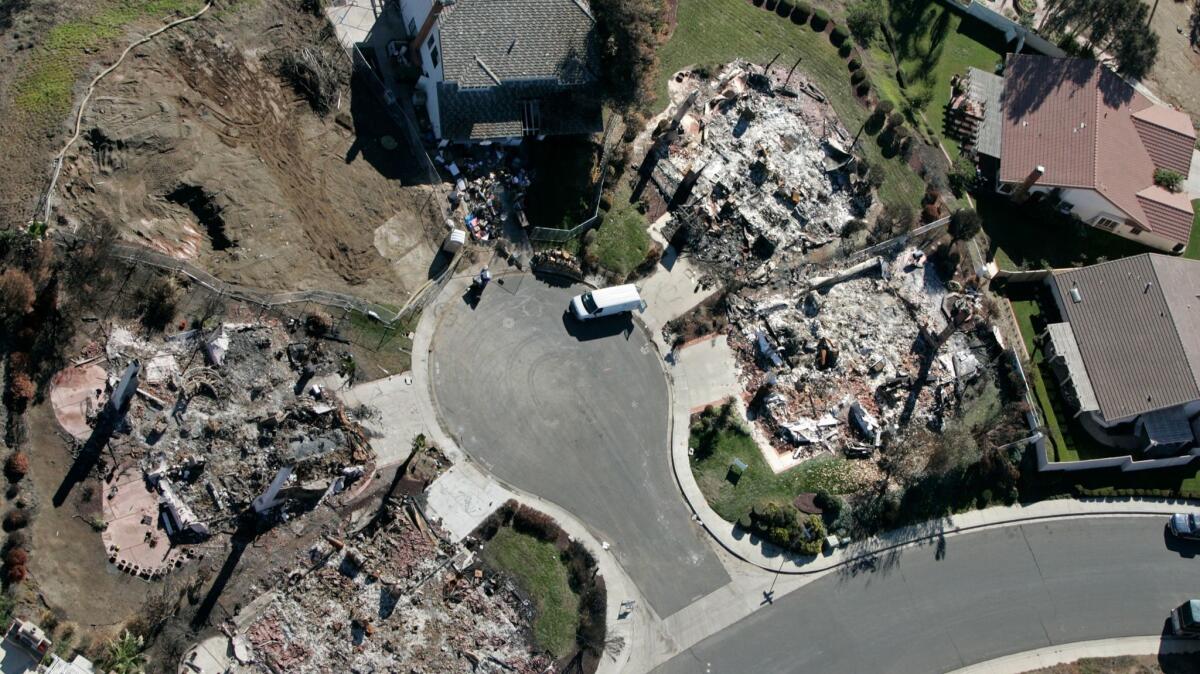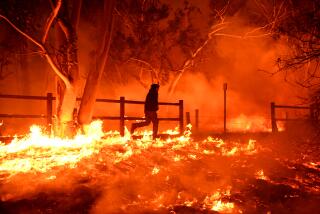Column: A utility’s own power lines allegedly caused devastating fires--but it’s still demanding that customers pay for the damage

- Share via
In the realm of adding insult to injury, one could hardly do better than San Diego Gas & Electric Co. The big utility’s downed power lines caused three major Southern California brush fires in 2007 that burned more than 198,000 acres, destroyed more than 1,500 homes, injured 40 firefighters and caused two deaths.
SDG&E thinks its ratepayers should cover $379 million, or 90%, of the costs it suffered from the fires. The ratepayers are understandably incensed, largely because two state investigations found that the utility’s slipshod maintenance of its own equipment and electric lines caused the fires and its slow response to reports of trouble contributed to the losses.
The damage of those fires was outside of our control.
— SDG&E; Vice President Dave Geier
“They want to spit in our face,” said one resident whose home was destroyed, speaking at a California Public Utilities Commission hearing on the utility’s request this week.
The utility’s position was delivered by Dave Geier, a vice president, who told the hearing that “the damage of those fires was outside of our control.” SDG&E says that unusually dry and windy conditions in the San Diego hillsides were the real cause of the fires. In 2009, SDG&E agreed to pay insurance companies about $685 million to reimburse them for payments to policyholders. But many of the policyholders said the payments from their insurers were insufficient. The utility also agreed to pay the state $14.3 million to settle allegations of shoddy maintenance. At the time, SDG&E maintained that “our system met all compliance and safety requirements but we fell short in meeting our obligation with respect to three follow-up reports.”
The battle over who should foot the bill for the Rice, Witch and Guejito fires of October 2007 is shaping up as a classic example of the genre of utilities trying to stick their customers for the cost of their own incompetence. California appears to be a hotbed of the category. Pacific Gas & Electric thinks ratepayers, not shareholders, should pay part of the costs of the 2010 San Bruno gas explosion, which leveled part of a San Francisco suburb and killed eight people. Southern California Edison is hoping that ratepayers will cover some of the cost of shutting down its San Onofre nuclear power plant, which was rendered permanently inoperable by an absolutely incompetent refurbishing project.
The wildfires share a key element with those episodes, according to separate investigations by the Public Utilities Commission’s Office of Ratepayer Advocates and its Consumer Protection and Safety Division. Both found that SDG&E violated safety regulations concerned with the maintenance of equipment, protection from vegetation growth and distance separating potentially short-circuiting apparatus.
The Office of Ratepayer Advocates report pointed to signs that the utility tried to destroy evidence by trimming a tree that brought down some of its equipment before investigators could examine it. And the Consumer Protection and Safety Division complained that SDG&E interfered with its investigation by refusing to allow interviews with its personnel.
The core findings, however, were that the utility violated regulations governing the permissible distance between electrically live cables and equipment and clearances between equipment and tree branches. The Rice Fire ignited on Oct. 22, 2007, in a woodsy grove in the San Diego County community of Fallbrook when a sycamore branch fell on overhead conductors strung between two poles and brought them to the ground. An SDG&E contractor had inspected the tree in July and advised SDG&E to cut it back within three months or it would begin to encroach on the equipment; SDG&E failed to do so.
The utility’s defense generally has been that unexpected Santa Ana wind conditions caused the damage to its lines and equipment, leading to the fires. The PUC investigators didn’t buy that as an excuse. PUC rules require utilities to keep local conditions in mind, and Santa Ana conditions, including gusts as high as those experienced when the fires began, are common annual occurrences in the region.
SDG&E executives have proposed that only 10% of the $421 million in costs at issue be billed to shareholders of its parent company, Sempra Energy. The remaining $379 million, if charged to ratepayers, would come to an average $1.67 per month per ratepayer if billed over six years.
It will be up to the PUC to decide how to divide up the costs between the utility and the ratepayers. Given that its own investigators have pointed to the utility’s own poor maintenance practices as causing the fires, the agency’s course should be clear.
Keep up to date with Michael Hiltzik. Follow @hiltzikm on Twitter, see his Facebook page, or email [email protected].
Return to Michael Hiltzik’s blog.
More to Read
Sign up for Essential California
The most important California stories and recommendations in your inbox every morning.
You may occasionally receive promotional content from the Los Angeles Times.










